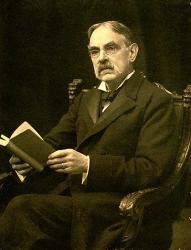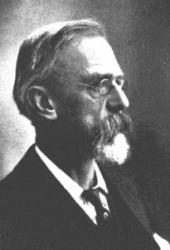Planning worship?
Check out our sister site, ZeteoSearch.org,
for 20+ additional resources related to your search.
- |
User Links
Person Results
J. W. Elliott
1833 - 1915 Person Name: J.W. Elliott Composer of "EUCHARISTICA" in The New Canadian Hymnal J.W. Elliott was a popular composer of the Victorian period, and is best known for his nursery rhyme music and for his work on hymnals in the 1870s. He was born James William Elliott, in Warwick, England, on February 13, 1833. As a child, he sang as a chorister in the Leamington Parish Church. In those days, choristers were given lessons in all facets of church music, including organ lessons, counterpoint studies, and more in exchange for providing an extraordinary level of service to their parish church (services throughout the week, all holidays, extra services, etc.). The result is that most choristers who completed their studies received an excellent music education, and James was no exception. After starting his career as an organist and choirmaster for a countryside church, his talent became obvious. He moved to London, where he assisted Sir Arthur Sullivan (of Gilbert and Sullivan fame) in editing Church Hymns. In addition, James worked for a music publisher.
His compositions include two operettas, numerous anthems, service music, works for instruments including the very popular harmonium, and most particularly for Nursery Rhymes and Nursery Songs, his children’s music score that sets many of the Nursery Rhymes to delightful music. Several of his hymn tunes are still in use today in many hymnals, most notably his hymn tune “Day of Rest.” He was heavily involved in the preparation of the musical edition of Church Hymns in 1874, the Choral Service Book of 1892, and transcriptions of hymn tunes using harmonies different than the traditional ones found in hymnals. He died in St. Marylebone, London, on February 5, 1915.
--www.nursery-songs.com/
J. W. Elliott
W. Garrett Horder

1841 - 1922 Person Name: W. Garrett Horder, 1814-1922 Adapter of "Once to Every Man and Nation" in Hymnbook for Christian Worship Horder, William Garrett, was born at Salisbury, and educated at the City of London School. In 1862 he entered Cheshunt College as a student for the Congregational Ministry. On leaving College in 1866 he undertook the pastorate of a Congregational Church at St. Helen's, Lancashire. In 1869 he removed to Torquay, and in 1873 to Wood Green, London, where he still resides. Mr. Horder has compiled—
(1) The Book of Praise for Children, 1875; (2) The Poet's Bible, New Testament 1881, Old Testament 1889; (3) Congregational Hymns: A Hymnal for the Free Churches, 1884. The first of these was incorporated in 1881 in The Book of Praise for Children, published by the Congregational Union under the editorship of the Rev. G. S. Barrett. With this latter book Mr. Horder had no association beyond the handing over of the former for the use of the Union. From Mr. Border's edition of this collection (the first) a Selection was published in 1883 "For the Use of Jewish Children." The Poet's Bible is a valuable collection of poetry for the use of students and preachers. The Congregational Hymns is referred to elsewhere. In addition Mr. Horder has published the following original works:—(1) Intimations of Immortality, 1883 ; (2) The Hymn Lover: An Account of the rise and growth of English Hymnody, 1889; (3) The Silent Voice and Other Discourses, 1890.
The Hymn Lover is practically a handbook to Mr. Horder's Congregational Hymns. As in that collection the hymns are gathered from all ages, nations, and churches, opportunity is afforded for the discussion of each epoch of hymn-writing and for the grouping together of interesting particulars concerning hymn-writers and their work. This opportunity Mr. Horder has availed himself of with great skill and judgment; and although the outcome is not severely technical, the result is all the more attractive for the general reader. Although hymnologically it is not a scientific production, practically and within its range, it is the most useful and attractive work we have on its special subject. The reproduction therein of specimen hymns of each epoch, is a new and valuable addition to this special kind of work.
--John Julian, Dictionary of Hymnology, Appendix I (1907)
=================
Horder, W. G. , p. 1531, i. Mr. Horder removed from Wood Green, London, to College Chapel, Bradford, in 1893, and then to Ealing Congregational Church, London, in 1906. In addition to the works named on p. 1531, i., he has published the following contributions to hymnological literature:—
(1) The Hymn Lover, 3rd and revised edition, 1894; (2) The Treasury of American Sacred Song, 1896, enlarged ed., 1900; (3) Hymns Supplemental to Existing Collections, 1894; (4) Worship Song, with Accompanying Tunes, 1905.
In 1897 the Howard University, Washington, conferred upon him the D.D. degree in recogni¬tion of his hymnological work.
--John Julian, Dictionary of Hymnology, New Supplement (1907)
W. Garrett Horder
William S. Bambridge

1842 - 1923 Person Name: W. S. Bambridge Composer of "ST. ASAPH" in Hymnal for Soldiers and Sailors
William S. Bambridge
Daniel Hughes
Person Name: D. H. Translator (stanzas 1, 2) of "Once to every man and nation (Unwaith i bob dyn a thylwyth)" in Mawl a chân = praise and song
Daniel Hughes
Robert Prescott Stewart
1825 - 1894 Person Name: R. P. Stewart, 1825-94 Composer of "ADRIAN" in The Methodist Hymn-Book with Tunes
Robert Prescott Stewart
Frank G. Ilsley
1831 - 1887 Composer of "ILSLEY" in For God and Country Born: Circa 1831, Maine.
As of 1880, Ilsley was teaching music in Newark, New Jersey.
--www.hymntime.com/tch
Frank G. Ilsley
David Evans
1874 - 1948 Composer of "YN Y GLYN" in The English Hymnal David Evans (b. Resolven, Glamorganshire, Wales, 1874; d. Rosllannerchrugog, Denbighshire, Wales, 1948) was an important leader in Welsh church music. Educated at Arnold College, Swansea, and at University College, Cardiff, he received a doctorate in music from Oxford University. His longest professional post was as professor of music at University College in Cardiff (1903-1939), where he organized a large music department. He was also a well-known and respected judge at Welsh hymn-singing festivals and a composer of many orchestral and choral works, anthems, service music, and hymn tunes.
Bert Polman
David Evans
Mark Andrews
1875 - 1939 Composer of "FOSDICK" in Hymns of the Living Church Mark Andrews was born in Erith, Kent, England in 1875 and emigrated to the United States in 1903. Trained at Westminster Abbey under organist John Thomas Ruch, he served as organist for St. Luke’s Episcopal, First Baptist, and First Congregational churches in Montclair, New Jersey. Andrews was a Fellow of the American Guild of Organists and an Associate of the Royal College of Organists, and he taught many pupils who became noted church musicians. A prolific composer of more than three hundred works, Andrews is remembered for hymn tunes such as Audrey (likely memorializing his daughter), Exultation, Fosdick, Whitney, and a distinct tune also titled Lauda Anima, written as an alternative setting for “Praise, My Soul, the King of Heaven.” His music reflects the English cathedral tradition blended with American congregational song, and several of his tunes remain in hymnals today.
J.S. McDuff (from Montclair church archives and early 20th-century hymnals including Hymns of the Living Church 1910, retrieved 9/15/2025)
Mark Andrews
William C. Filby
1833 - 1913 Person Name: W. C. Filby Composer of "GORDON" in Worship Song Baptized: St. Paul, January 16, 1833, Hammersmith, Middlesex, England.
Died: June 22, 1913, Richmond, Surrey, England.
Son of William and Lucy Filby, William studied in France, and played the organ at St. Peter’s Church, Hammersmith (1849); Bromley Parish Church, Kent (1853); the London churches of St. Peter, Walworth; St. Matthew, Bayswater; and St. Luke, Westbourne Park; Holy Trinity, Margate, Kent; Holy Trinity, Stepney, London; and St. Paul, West Greenwich, London (1884). He also served as organist at the International Exhibitions of 1882 and of 1885, wrote and lectured on church music, opera and music education, and composed organ voluntaries, operettas, songs, part songs and choruses.
--www.hymntime.com/tch/
William C. Filby


 My Starred Hymns
My Starred Hymns

